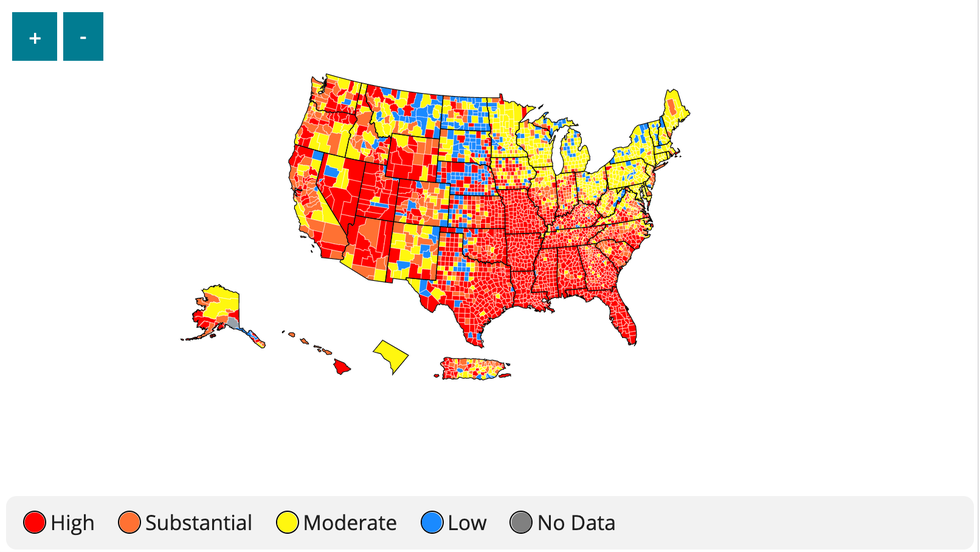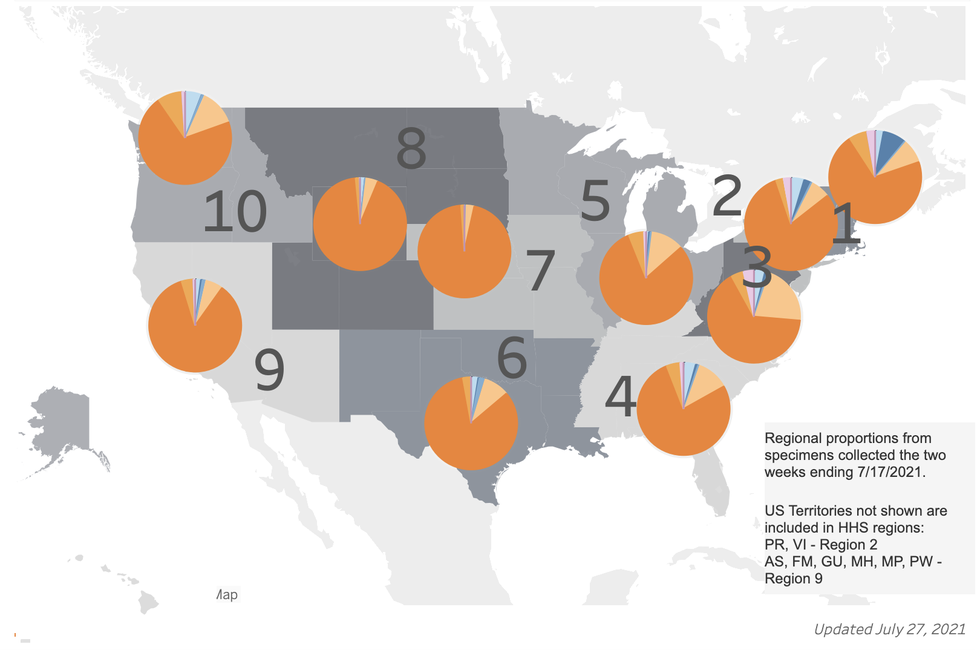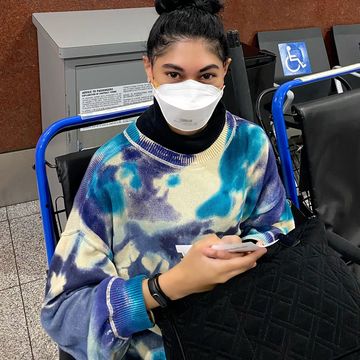- The Centers for Disease Control and Prevention (CDC) now recommends that fully vaccinated people continue to wear masks in public indoor spaces and practice other coronavirus safety measures.
- A leaked internal report from the CDC suggests that the Delta variant is as contagious as chicken pox and causes more severe illness than other COVID-19 strains, but more research is needed to support the new data.
- New data from the CDC also shows that 74% of people infected in a COVID-19 outbreak in Massachusetts were fully vaccinated.
This week, the Centers for Disease Control and Prevention (CDC) released a brand new set of guidelines for where and when fully vaccinated individuals should wear masks. The new rules were put in place to better combat the spread of the highly transmissible Delta variant of the coronavirus.
The new recommendations state that fully vaccinated people should wear masks indoors in areas with "substantial" and "high" COVID transmission, or nearly two-thirds of all U.S. counties.
Even as the U.S. population hovers around halfway fully vaccinated, the CDC and the World Health Organization are urging people not to throw caution to the wind. The Delta variant has already shown a faster transmission rate than other strains of COVID-19, and experts are continually learning more about it.
The WHO has been tracking COVID-19 variants since the beginning of the pandemic, and the Delta variant has been elevated into a "variant of concern" because it's more contagious.
Here's everything you need to know about the Delta variant—and how to protect yourself and others.
What is the Delta variant?
The CDC recently labeled Delta as the dominant COVID-19 variant in the U.S., per NPR. While the strain was first found in India, it has now spread to 80 countries, and it targets the most vulnerable individuals (mostly in places with low vaccination rates), per The New York Times.
There isn't enough research yet to confirm reports that the Delta variant may cause more severe symptoms. But Delta is potentially "more lethal because it's more efficient in the way it transmits between humans and it will eventually find those vulnerable individuals," says Dr. Mike Ryan, executive director of the WHO's health emergencies program.
How serious is the Delta variant?
CDC director Rochelle Walensky said during a White House briefing late July that the Delta variant is "more aggressive and much more transmissible" than other strains of COVID-19, per The Washington Post. She also called it "one of the most infectious respiratory viruses we know of and that I have seen in my 20-year career."
While it's clear that the Delta variant is more contagious, there still isn't enough research to determine how sick it will make you if you contract it. But experts are also noting that the Delta variant is more of a threat in communities with lower vaccination rates.
"Fully vaccinated Americans have a high degree of protection, including against this delta variant," President Biden said, per The Washington Post. So, how serious it is could depend on where you live.
The CDC has a map that can show you the COVID risk in your area on its website:
Current hotspots for the virus include Florida, Arkansas, Missouri, and Louisiana, per Fortune.
Is the Delta variant already in the U.S.?
Yes, the Delta variant has already arrived in America. In a news briefing this week, the CDC announced that currently, more than 80% of novel coronavirus infections in the U.S. are a result of the Delta variant.
The CDC continues to add to its interactive map of Delta variant cases in the U.S.:
The bright orange wedges in each pie chart shows how many COVID cases in that area are due to the Delta variant.
Who is at risk for contracting the Delta variant?
Experts say that people in places with low COVID-19 vaccination rates are among the most vulnerable populations. "There still are big portions of the country where the rates of vaccination are quite low," said Dr. Jeremy Luban, a virologist at the University of Massachusetts Medical School, per NPR.
The new CDC guidelines released in July explain that "wearing a mask is most important if you have a weakened immune system or if, because of your age or an underlying medical condition, you are at increased risk for severe disease, or if someone in your household has a weakened immune system, is at increased risk for severe disease, or is unvaccinated." These individuals are at a higher risk of contracting the Delta variant.
What new guidelines have the CDC released about the Delta variant?
On July 27th, the CDC recommended that fully vaccinated individuals continue to wear masks in public indoor settings in areas of substantial or high transmission. The CDC also advised vaccinated people who are immunocompromised or at increased risk for severe disease from COVID-19 to wear masks everywhere. (This guideline also applies to vaccinated people who live with an immunocompromised individual.)
In addition, the CDC recommended that all teachers, students, staff, and visitors in schools practice "universal indoor masking," regardless of whether they are vaccinated or not.
Experts like Dr. Bob Wachter, a professor and chair of the department of medicine at the University of California San Francisco, are strongly advising people to follow the new guidelines. "I see going maskless indoors as not only potentially putting myself at risk but also others–particularly immunosuppressed people, children, and those who have chosen not to be vaccinated," he wrote in an email, per SFGate.
Dr. Amesh Adalja, an assistant professor at the John Hopkins Bloomberg School of Public Health, talked with Women's Health about the new CDC guidelines.
He stressed that getting people vaccinated is a big part of how effective these guidelines will be. "We know that we're in a pandemic of the unvaccinated," he said. "When you walk through a hospital and look at the COVID patients, they are almost uniformly all not vaccinated."
As for children who are still too young to be vaccinated, Adalja said that for many, the Delta variant is not a huge concern. "I think for many healthy children, COVID-19 is not a major threat for them. It’s on par with other respiratory viruses," he said. "The more vaccinated the country is, the more it will protect children who can’t be vaccinated because it will decrease prevalence."
Does the coronavirus vaccine protect against the Delta variant?
Yes. Dr. Rochelle Walansky, the director of the Centers for Disease Control and Prevention, says that COVID-19 vaccines do protect against the Delta variant. "We know our vaccines work against this variant," she said, per NPR. "However this variant represents a set of mutations that could lead to future mutations that evade our vaccines. And that's why it's more important than ever to get vaccinated now to stop the chain of infection, the chain of mutations that could lead to a more dangerous variant."
Can I still get COVID if I'm fully vaccinated?
Yes, but the chances are small. Any case contracted after an individual has already been fully vaccinated is considered a breakthrough case. And some Delta cases have already been labeled breakthrough cases, according to The Wall Street Journal.
The CDC stopped tracking all breakthrough cases back in May. But they aren't as serious as they might sound: "If you're fully vaccinated, your chances of being hospitalized of COVID are close to zero," Adalja told Women's Health.
As for whether Delta variant breakthrough infections are more common, Adalja notes that "it's plausible," but adds that "they still appear to be rare."
Dr. Fauci gave NPR the statistics: "if you look at the number of deaths of COVID-19 in this country, 99.5% of them are among unvaccinated individuals, and 0.5% are among vaccinated individuals. I think that's a statistic that is pretty self-explanatory," he said.
New data from the CDC does show that 74% of people infected in a recent COVID-19 outbreak in Massachusetts were fully vaccinated. However, only four of those people were hospitalized, per CNBC.
"This finding is concerning and was a pivotal discovery leading to CDC’s updated mask recommendation," Walensky said. "The masking recommendation was updated to ensure the vaccinated public would not unknowingly transmit the virus to others, including their unvaccinated or immunocompromised loved ones."
The CDC has also noted that the data has limitations. It's likely that, as more people get vaccinated, vaccinated people will represent a larger percentage of COVID-19 cases, per CNBC. Plus, researchers are still in the early stages of gathering and interpreting the new data.
Will I need a vaccine booster shot?
Possibly. Some experts are beginning to consider vaccine booster shots as one defense against the Delta variant, per Nasdaq. They're studying whether people who received Johnson & Johnson's JNJ.N one-dose vaccine might need booster shots of the Pfizer/BioNTech PFE.N, BNTX.O or Moderna MRNA.O mRNA-based vaccines in order to protect themselves.
A few experts have already gotten booster shots, just to be safe, even though only preliminary data exist on whether combining different vaccines is safe and effective. Dr. Peter Hotez from Baylor College of Medicine tweeted that getting a J&J dose on top of a Pfizer or Moderna dose could offer better protection, but further guidance was necessary.
"In the phase 1-2 data, two doses of JnJ gave higher virus neutralizing antibodies than a single dose, and therefore might be better and broader protection against variants?" Hotez wrote. "Or a single dose JnJ followed by mRNA, but we need data and CDC-FDA guidance."
Johnson & Johnson said it is currently testing whether people's immune response from its vaccine could fight back against the Delta variant, but no data is available yet, per Nasdaq.
And a new study conducted by Pfizer found that a third dose of the Pfizer vaccine can "strongly" increase protection against the Delta variant, per CNN. Researchers estimate that receiving a third Pfizer dose can increase "Delta neutralization" by up to 100 times, compared to only having two doses of the vaccine. However, the study is still in its early stages.
The new data leaked from an internal CDC internal document (more on that below) indicates that the vaccines aren't as effective in immunocompromised patients and nursing home residents, so it's possible these populations and other at-risk individuals might need of a third vaccine dose, per The Washington Post.
What is the Delta-plus variant?
After the Delta variant surfaced, a newer "Delta-plus" variant was also identified in India and has now spread to over ten countries, per NBC News. Not much is known about Delta-plus, since researchers haven't had much time to study it yet, but it's believed to also be highly transmissible (like the Delta variant), per Los Angeles Times.
Dr. George Rutherford, an epidemiologist at UC San Francisco, says “it sounds like just another variant that’s no better, no worse, than the regular Delta variant, and it’s a little unclear why everybody’s pushing on it. I don’t see that this is a big, big problem right now."
Dr. Monica Gandhi, an infectious disease expert at UC San Francisco, told the Los Angeles Times that "I know it keeps on seeming like there’s more and more, and so it’s certainly understandable why people are like, 'Why doesn’t it stop?' Once you tamp down transmission, it really will stop accumulating these mutations... That is the reason why we want to, of course, have global vaccine equity: to stop transmission."
An internal CDC document suggests that Delta might be more contagious and cause more severe illness, but more research is needed.
Just days after the CDC released its new guidelines, an internal document with preliminary information was leaked. This new (not yet published) data suggests that the Delta variant causes more severe illness than other COVID-19 variants and spreads faster than Ebola or the common cold, per The Washington Post.
However, the information included a disclaimer stating that the findings were those of the authors and might not represent the CDC's official position.
The document also contained unpublished data that found that vaccinated individuals who become infected with the Delta virus might be able to transmit it just as easily as those who are unvaccinated can.
"I think the central issue is that vaccinated people are probably involved to a substantial extent in the transmission of delta,” Jeffrey Shaman, a Columbia University epidemiologist, told The Washington Post in an email. "Vaccination is now about personal protection—protecting oneself against severe disease. Herd immunity is not relevant as we are seeing plenty of evidence of repeat and breakthrough infections."
Vaccine expert Kathleen Neuzil at the University of Maryland School of medicine also offered her take on the new data. "We really need to shift toward a goal of preventing serious disease and disability and medical consequences, and not worry about every virus detected in somebody’s nose," she said, per The Washington Post. "It’s hard to do, but I think we have to become comfortable with coronavirus not going away."














